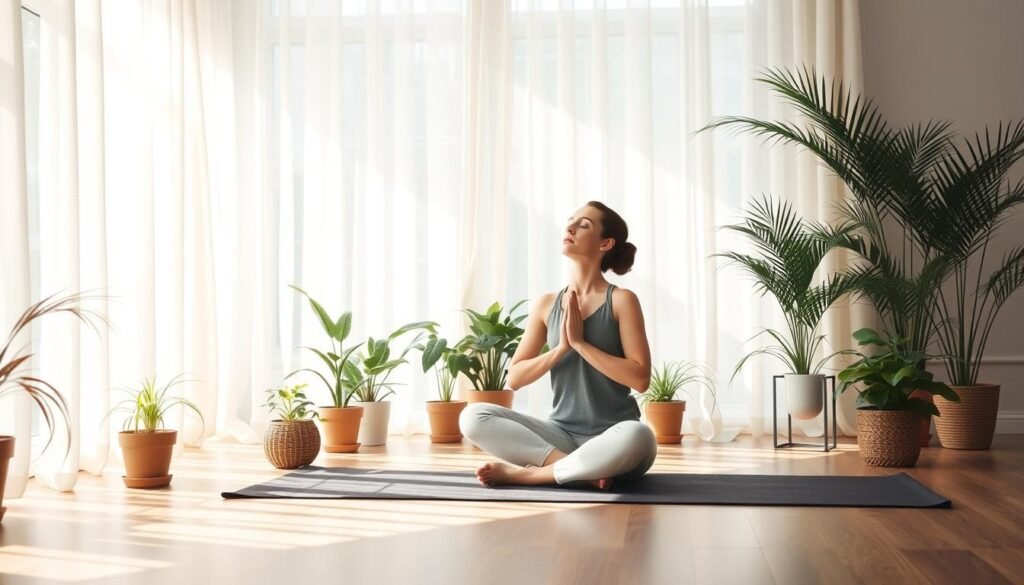Did you know about 40 million adults in the U.S. deal with anxiety disorders? This makes it the top mental health issue in America. Understanding how to handle days filled with anxiety is key. Anxiety can affect our minds and bodies in daily life. It comes with symptoms that might change our daily routines. In this article, you’ll find tips and solutions from experts. They will help you find calmness and boost your well-being. By looking at different strategies, you can learn to fight anxiety. This includes quick coping skills and diet changes. Ready to take on anxiety and improve your mental health? Let’s dive in.
Key Takeaways
- Anxiety affects nearly 40 million adults in the U.S., making effective management essential.
- Understanding the difference between general anxiety and anxiety disorders is crucial.
- Immediate coping skills include deep breathing, exercise, and questioning thought patterns.
- Long-term strategies involve therapy, medication, and dietary adjustments.
- Regular exercise and social connections can significantly improve anxiety symptoms.
- Monitoring triggers and maintaining a positive mindset are vital in managing anxiety.
Understanding Anxiety and Its Symptoms
Anxiety is our body’s way of responding to danger. It impacts our day-to-day life significantly. Different people may experience various symptoms, leading to mental health challenges. It’s important to know the common signs of anxiety to tell the difference between normal stress and more serious conditions.
Common Signs of Anxiety
Those with anxiety may show several symptoms. Key signs to watch for include:
- Excessive worrying about daily issues
- Feeling restless or on edge
- Muscles being tense or tight
- Struggling to focus or blanking out
- Having trouble sleeping, including insomnia
Understanding these symptoms is helpful for recognizing when stress goes beyond typical levels. This knowledge plays a vital role in getting the right help and dealing with possible anxiety disorders.
Differentiating Between Worry and Anxiety Disorders
While worry is common, anxiety disorders are more intense and long-lasting. They consist of extreme fear that disrupts one’s life. Disorders like Generalized Anxiety Disorder (GAD) and panic disorder show how worrying too much can lead to significant mental health issues.
In the U.S., around 40 million adults face anxiety disorders each year. This means 1 out of every 5 adults struggles with these conditions annually. Knowing the difference is crucial for those needing specific treatments like psychotherapy or medication. Funding for research helps in understanding and treating these disorders better.
Recognizing Anxiety Ridden Days
Understanding anxiety involves knowing what causes it. Stress from work, problems in relationships, or big changes in life can be triggers. It’s key to spot these triggers for better anxiety management. Knowing what sets off your anxiety helps you find the best ways to cope.
Identifying Triggers of Anxiety
People often feel more anxious in certain situations. These can include:
- Work stress
- Relationship conflicts
- Financial worries
- Health concerns
- Significant life events
Keeping an eye on these stress signs helps recognize anxiety causes. This leads to coping methods that improve emotional health.
Signs Your Anxiety is Heightened
Knowing when anxiety gets worse is key. Symptoms can vary, but often include:
- Panic attacks
- Increased nervousness
- Physical discomfort or soreness
- Difficulty concentrating
- Excessive irritability
Seeing these signs means you need to act to manage your anxiety. Acting fast lets people handle their anxiety better.
https://www.youtube.com/watch?v=CfEFM2L0ILg
Acknowledge and Accept Your Anxiety
Understanding and accepting your anxiety is key to managing it well. Many think they must control their anxiety. But, trying to push away these feelings can make things worse. Instead, learning to accept anxiety helps. It lets people deal with their fears openly, without being scared. This method boosts emotional strength and may lessen anxiety over time.
The Importance of Facing Anxious Thoughts
It’s better to confront anxious thoughts than to avoid them. Acknowledging anxiety as a part of life is the first step. It makes these experiences seem more normal. Writing about your feelings or practicing mindfulness can help understand them better. Facing your thoughts on purpose can stop them from overpowering you. This leads to a healthier mindset.
How Acceptance Can Reduce Anxiety
Acceptance is crucial in dealing with anxiety. It helps people see that anxiety doesn’t control them. Instead of fighting these feelings, learning to live with them is better. Experts often suggest acceptance to reduce anxiety. It weakens the hold these feelings have. Practices like mindfulness or therapeutic activities can help build acceptance. This can bring about a sense of calm.
Effective Coping Strategies for Anxiety
Feeling overwhelmed by anxiety is common. Yet, effective coping strategies can greatly ease this feeling. Deep breathing and grounding techniques stand out. They not only offer prompt relief but also fit easily into daily life.
Deep Breathing Techniques
Deep breathing is key for calming down. It triggers a state of relaxation, slowing down your heart and easing stress. By focusing on your breath, you can distract yourself from anxious thoughts. Practices like the 4-7-8 method are quite helpful. This involves inhaling for four seconds, holding it for seven, then exhaling for eight. Those with anxiety find deep breathing very healing.
Grounding Techniques to Manage Panic Attacks
For those fighting anxiety disorders, grounding techniques are a life-saver. They help you connect with the present, easing overwhelming feelings. Using your senses, you notice the world around you, which helps during panic attacks. Mental grounding, like the 5-4-3-2-1 technique, is also useful. It involves noticing things around you, like five things you can see or four things you can touch. Check out these effective resources for more on grounding techniques. They help you confront anxiety more confidently.

| Technique | Description | Benefits |
|---|---|---|
| Deep Breathing | Controlled inhalation and exhalation to promote relaxation. | Slows heart rate, reduces stress, calms the mind. |
| Physical Grounding | Engaging the senses to redirect attention. | Offers immediate relief during panic attacks. |
| Mental Grounding | Redirecting thoughts using mental exercises. | Can be practiced anywhere, assists in calming anxiety. |
The Role of Nutrition in Managing Anxiety
It’s essential to understand how nutrition and anxiety are linked. A balanced diet affects not only our body but our mind too. Including certain foods in your daily diet can help fight stress and boost mental health.
Eating Well to Combat Stress
Eating enough fruits and vegetables can reduce stress. A study in 2021 found that people eating at least 470 grams a day were 10% less stressed than those who ate less. It shows eating whole foods over processed ones is key.
Having protein-rich foods every three hours keeps blood sugar steady. This helps keep your mood stable. Too much caffeine can make your heart race and worsen anxiety. Eating right can prevent the cycle of anxiety and low blood sugar.
Foods that Promote Mental Health
Some foods can really help your emotional well-being. Foods high in omega-3 fatty acids, like salmon, walnuts, and flaxseeds, can decrease anxiety. Eating complex carbs and magnesium-rich foods, such as whole grains, legumes, spinach, and avocados, helps too.
Adding B vitamins from leafy greens and legumes is good for mood regulation. A diet focusing on whole foods is advised for dealing with anxiety, as per nutritional psychiatry. Here’s a table of foods that are good for mental health:
| Food | Nutrient | Benefit |
|---|---|---|
| Salmon | Omega-3 fatty acids | Reduces anxiety symptoms |
| Spinach | Magnesium | Helps alleviate anxiety |
| Almonds | Vitamin E | Supports brain health |
| Whole grains | Complex carbohydrates | Promotes calmness |
| Leafy greens | B vitamins | Regulates mood |
Exercise and Its Impact on Anxiety
Regular exercise does wonders for mental health. It not only improves well-being but also helps relieve anxiety. Exercise leads to the release of endorphins, reducing stress and bettering mood.
Benefits of Regular Physical Activity
Physical activity has big benefits for mental health. Just 30 minutes of exercise five times a week has great effects. These benefits include:
- Running for 15 minutes or walking for an hour daily can cut depression risk by up to 26%.
- Exercise boosts mood and energy.
- It provides natural anxiety relief and boosts self-esteem.
- It supports other anxiety treatments, like talk therapy and meds.
- Exercising with others can improve your mood even more.
Types of Exercises to Reduce Anxiety
Many exercises can help with anxiety. It’s best to start slow, especially if you’re new or returning. Good exercises for anxiety relief include:
- Walking: A simple, effective way to lift your spirits.
- Yoga: Great for relaxation and flexibility, combines movement with mindfulness.
- Running: Boosts endorphin levels for a strong mood lift.
- Dancing: Fun and social, with great benefits for the heart.
Exercise, even in short bursts, can boost mental health. Always check with a doctor before starting a new exercise program.

Creating a Calming Environment
A calming environment helps a lot in managing stress and cutting down anxiety. Making simple changes at home can create a stress-free home. Adding things that bring peace can greatly improve your mental health.
Ways to Reduce Stress at Home
To make a home more peaceful, you can try these steps:
- Declutter to create a neat space.
- Use calming colors like soft blues and greens in your decor.
- Make quiet spots for relaxing and mindfulness.
- Do deep breathing exercises to stay calm all day.
- Use positive self-talk to fight off negative thoughts.
Mindfulness keeps you stable and focused, helping you handle worries better. Adding relaxation techniques into your calm space works well.
The Power of Aromatherapy
Aromatherapy can make your space more peaceful. Scents like lavender and chamomile calm your mind and body. Using these smells in daily life helps fight anxiety:
- Spread essential oils in your home for ongoing calm.
- Put some oil drops in your bath for a relaxing soak.
- Carry aromatherapy rollers for stress relief during the day.
This turns your home into a stress-free zone, with soothing aromas that boost your mood. Also, spending time outside in nature is great for your mental health. Just 120 minutes a week outside can make a big difference in how you feel.
To create the best calming environment, combine mindful actions with things that appeal to your senses. This approach improves mental health. By adopting these methods, you can live more peacefully, reducing anxiety symptoms.
Establishing Healthy Sleep Habits
Healthy sleep habits are key in managing anxiety. Insomnia and anxiety often create a vicious cycle. It becomes hard to find peace. By making sleep a priority, we can break this cycle. This leads to better mental and physical well-being. Setting up a consistent bedtime routine is crucial. It helps improve sleep quality and ease anxiety symptoms.
How Lack of Sleep Affects Anxiety
Lack of sleep can really push up your anxiety levels. Adults need between 7 and 9 hours of sleep every night. When we get less, especially under five hours, the risk for mental health problems and chronic diseases climbs. Not sleeping enough hurts our ability to think clearly. It can make us forgetful and more stressed out. But, with healthy sleep habits, we can lower these risks and feel more stable.
Bedtime Routines for Better Sleep
Having a bedtime routine can make your sleep better and calm your anxiety. Think about these steps for your night routine:
- Cut down on screen time before bed to sleep better.
- Keep your bedroom dark and cool, around 15-19°C.
- Steer clear of caffeine at least 10 hours before bed.
- Try relaxation techniques like the 478 breathing method or the Navy SEAL sleep method.
- Drink calming teas like chamomile to ease into sleep.
Tools like Sleepio or Sleep Cycle Alarm Clock can help improve your sleep habits. Also, the 321 method for sleep hygiene can be beneficial. By being consistent and mindful in our approach, we can develop healthier sleep habits. This greatly aids those dealing with insomnia and anxiety.
Seeking Professional Help for Anxiety Disorders
For those dealing with anxiety disorders, getting professional help is crucial for recovery. Many therapeutic options exist to manage symptoms well. Knowing about therapy and medication choices helps people take control of their mental health.
Therapies Available for Anxiety Management
Therapy is key for teaching coping methods and strategies for anxiety. Some well-known therapies include:
- Cognitive Behavioral Therapy (CBT) – Aims to change negative thoughts and actions.
- Dialectical Behavioral Therapy (DBT) – Focuses on controlling emotions and improving coping skills.
- Exposure Therapy – Slowly introduces anxiety triggers to lessen fear.
- Acceptance and Commitment Therapy (ACT) – Promotes accepting feelings instead of resisting them.
Many find major improvements and relief after five to eight therapy sessions.
Understanding Medication Options
Anxiety medication can greatly help, especially in severe cases. Here are some common medication types:
| Medication Type | Examples | Indications |
|---|---|---|
| Selective Serotonin Reuptake Inhibitors (SSRIs) | Fluoxetine, Sertraline | Generalized Anxiety Disorder, OCD |
| Benzodiazepines | Diazepam, Lorazepam | For short-term severe anxiety relief |
| Beta-Blockers | Propranolol | Helps with performance anxiety, physical symptoms |
Talking to a mental health expert can create a plan that includes therapy and the right medications. This holistic approach is aimed at treating anxiety disorders fully.
Building a Support Network During Anxious Times
Having a support network for anxiety is key to coping with its challenges. It helps one feel less alone in their struggles. Such connections reassure and understand you, making hard times a bit easier.
The Importance of Connecting with Others
Being close to others helps a lot with mental health. Studies say strong social support can make you resilient. It leads to less anxiety and depression, and more happiness.
People with good friends or family cope better with their feelings. This boosts emotional health. Also, meeting face-to-face helps a lot, thanks to non-verbal cues that strengthen connections.
How to Talk About Your Anxiety with Loved Ones
Talking about anxiety with family or friends can seem hard but is very rewarding. Be honest and open in these talks. Here’s how to start:
- Pick a good time and place where you feel safe and private.
- Use “I” statements to talk about your feelings, avoiding blame.
- Let them ask questions, and share your experiences openly.
- Thank them for their support and understanding.
These steps can make your support network stronger. This leads to deeper connections. For more help, check out resources like stress management techniques.

| Benefits of Social Support | Impact on Mental Health |
|---|---|
| Improved Resilience | Less anxiety and depression |
| Enhanced Happiness | Stronger emotional connections |
| Increased Longevity | Healthier lifestyle choices |
| Cognitive Functioning | Slower cognitive decline |
Building a strong social network helps a lot with anxiety. It shows the need for healthy talks about mental health.
Conclusion
Handling days filled with anxiety is challenging. It’s important to understand anxiety well. Knowing the signs and what triggers anxiety is key. This knowledge helps people navigate their feelings better.
Using strategies like Cognitive Behavioral Therapy (CBT) is crucial. CBT works by finding and fixing harmful thoughts. This leads to healthier thinking patterns.
Having a strong support network is also vital. It gives emotional support. Connecting with others helps reduce feelings of being alone. Plus, it’s okay to get help from professionals for more personalized advice.
With the right support and methods, life can become calmer and more rewarding. The journey to manage anxiety well takes effort and patience. But, it’s achievable.
Reducing anxiety isn’t quick or easy. But with commitment and the right advice, people can become more resilient. Following the tips from this article helps. They can find peace and confidence. This opens the door to a hopeful and brighter future.